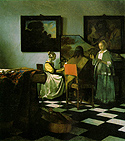Art Smuggler Offers Italy Mystery Masterpiece `X' to End Trial
By Vernon Silver
Sept. 25 (Bloomberg) -- A convicted antiquities smuggler has offered to return a previously unknown ancient masterpiece known as ``Object X'' to Italy in exchange for reducing the jail time and fines he faces for supplying loot to U.S. museums.
A famous artist from the ancient world whose work compares to that of Michelangelo or Leonardo da Vinci created Object X, says the convicted art dealer, Giacomo Medici, who is free while awaiting appeal. The object, which may be a statue, vase, or something else -- he's not saying -- is worth millions, he says.
``It's something they can only dream about,'' Medici, 68, says of the Italian officials with whom he's negotiating to cut his 10-year prison sentence and 10-million euro ($12.8 million) fine. ``And only I can bring it to them.''
Medici's case is part of a broader prosecution that includes Marion True, the former antiquities curator at the J. Paul Getty Museum in Los Angeles, who is on trial in Rome for conspiracy and receiving smuggled art. She denies the charges.
The mystery masterpiece, if it exists, risks never coming to light if Medici and prosecutor Paolo Ferri fail to reach an agreement by Oct. 4, when a Rome court is scheduled to hear Medici's appeal. Italian law bars plea bargaining after an appeal starts, Ferri says.
A sticking point is that Medici wants a guarantee that the market value of the work, referred to as Object X by both sides in the talks, will wipe out his fine. The prosecutor says he wants to see the object before making promises.
Dubious Prosecutor
``It could be a bluff,'' says Ferri, who says he'd rather lose Medici's masterpiece than get duped. ``I'm sorry if it's important.''
Medici, describing the proposal over a lunch of grilled calamari in Rome, refuses to say where the object is or how quickly he can get his hands on it. ``It could be a flight from Australia or three hours by train from Naples,'' he says.
The Getty, New York's Metropolitan Museum of Art and Boston's Museum of Fine Arts agreed this year to return antiquities to Italy based in part on evidence from Medici's December 2004 conviction for conspiracy, smuggling and receiving stolen antiquities.
Among the objects Medici was convicted for smuggling is a 2,500-year-old krater vase for mixing wine, painted by the Greek artist Euphronios, purchased by the Met in 1972 for $1 million. The Met agreed in February to give the pot and 20 other antiquities back to Italy.
Medici, a stocky, balding man, says the object he's offering is worth as much as the Euphronios krater, which the Met considered the finest Greek vase in its collection.
Ancient Goddess?
He says he's leaving Italian officials to wonder if Object X is another painted vase or a bronze by Lysippos, the personal sculptor of Alexander the Great, an ivory head or a 2,300-year- old goddess carved by the Greek master Praxiteles.
Equivalent objects have been valued at more than 10 million euros in the international antiquities market. Such a masterpiece has eluded Italian police who've searched Medici's homes over the past decade, breaking down walls in search of hidden compartments.
On Sept. 20, prosecutor Ferri offered to reduce Medici's sentence to six years and to use Object X to offset the 10- million euro fine, but he wouldn't guarantee that it would wipe out the whole debt, Medici says. In return, Medici would drop his appeal, letting the conviction stand.
Ferri says he can't comment on details of continuing talks but doesn't dispute Medici's general account. A six-year sentence would likely result in probation with no jail time, Ferri and Medici say.
Medici's Appeal
For Italy, such a deal would eliminate the risk of the court overturning Medici's conviction and endangering future talks with museums and other smuggling prosecutions.
Medici's lawyers have filed a 78-page appeal at the Rome Tribunal that says the evidence doesn't prove Medici handled the objects or that the antiquities were stolen from archaeological sites in Italy. The appeal, obtained by Bloomberg News, also says procedural violations should lead to the case's dismissal.
Ferri has filed a point-by-point rebuttal of the appeal, which by law he cannot make public, he says. The prosecutor says Medici's appeal is based mostly on technical issues and not on the substance of the charges.
Medici argues that he'll be exonerated by a rational look at the case, which consists mostly of photographs seized from his Geneva warehouse. The photos depict antiquities in various states of restoration before they arrived at the Met, Getty and other museums.
He says people often sent him photos of objects to appraise as an art expert.
``It's unjust to convict someone for trafficking in an object just because he has photos,'' says Medici, who traveled the world buying and selling antiquities before the court seized his passport in 2004.
The prosecutor says Medici's latest promise to come up with a masterpiece shows the conviction hasn't kept the Roman dealer from the antiquities trade.
``It means he's continuing to traffic,'' Ferri says.
To contact the reporter on this story: Vernon Silver in Rome at vtsilver@bloomberg.net

No comments:
Post a Comment